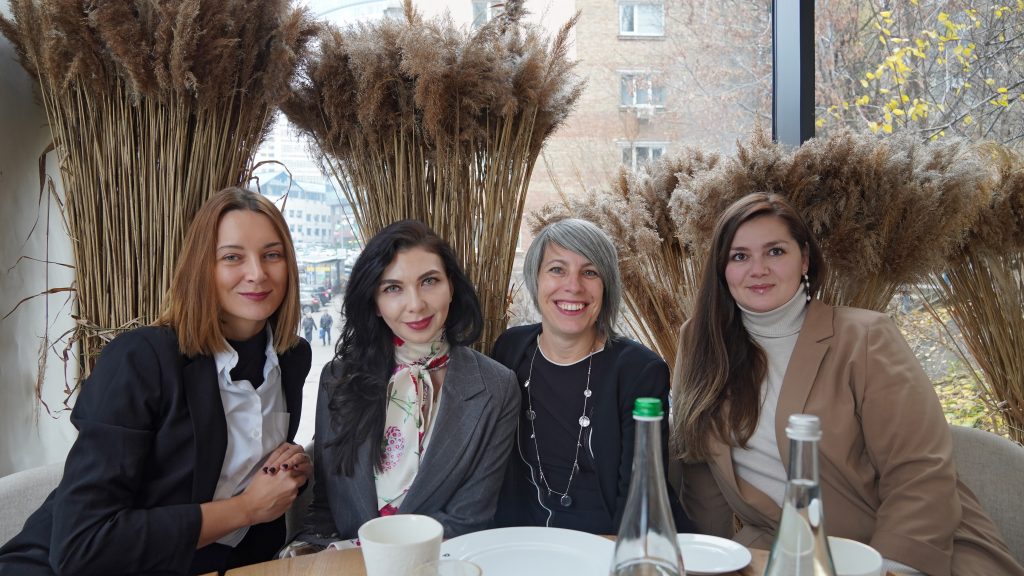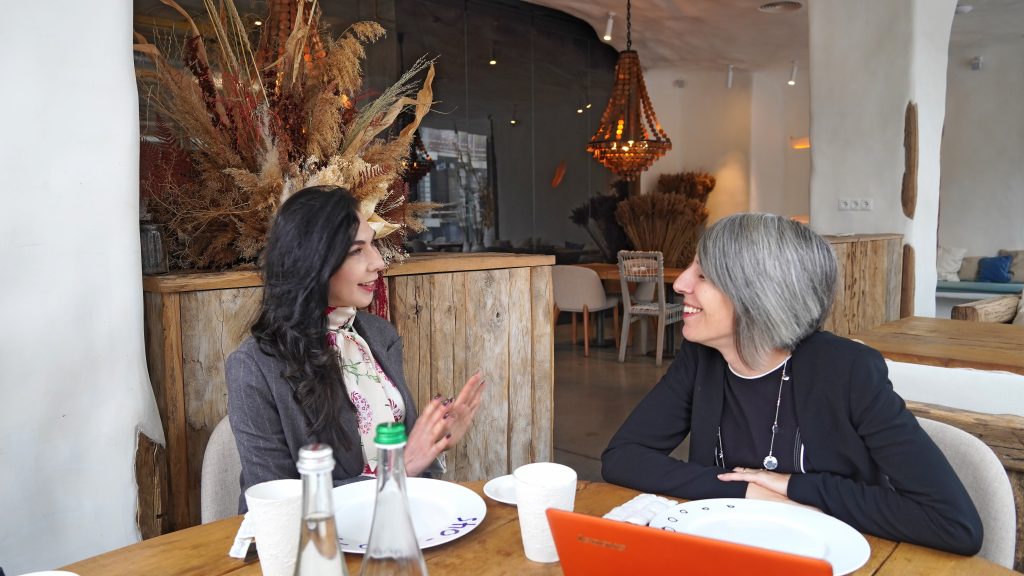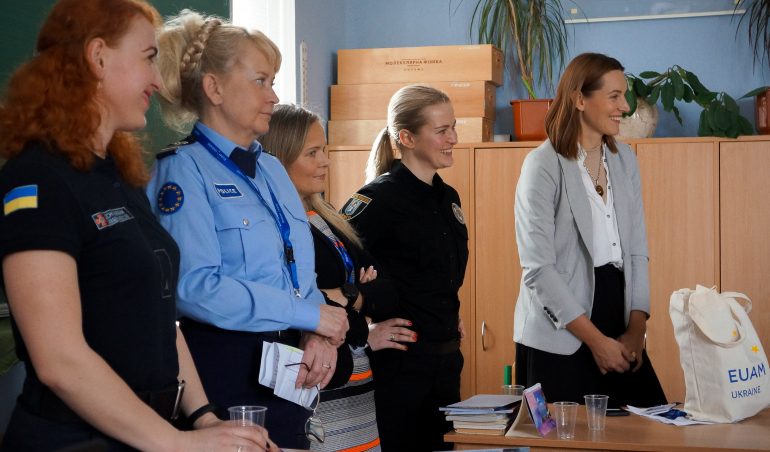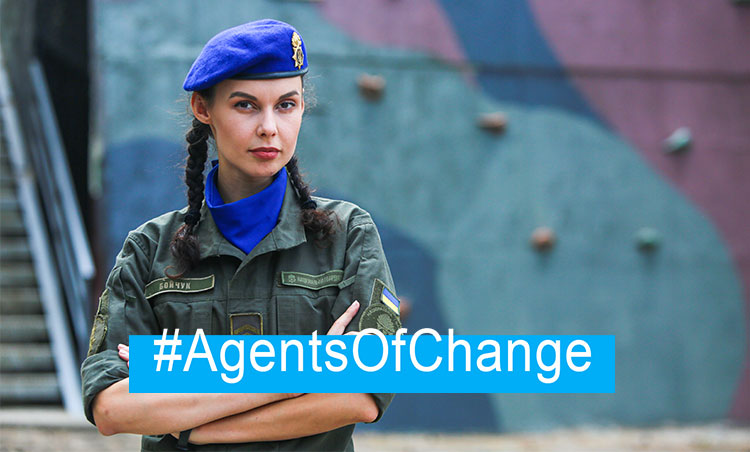Tetiana Kovalchuk: mentoring programme ‘gave me ability to reveal my vulnerability’
December 06, 2019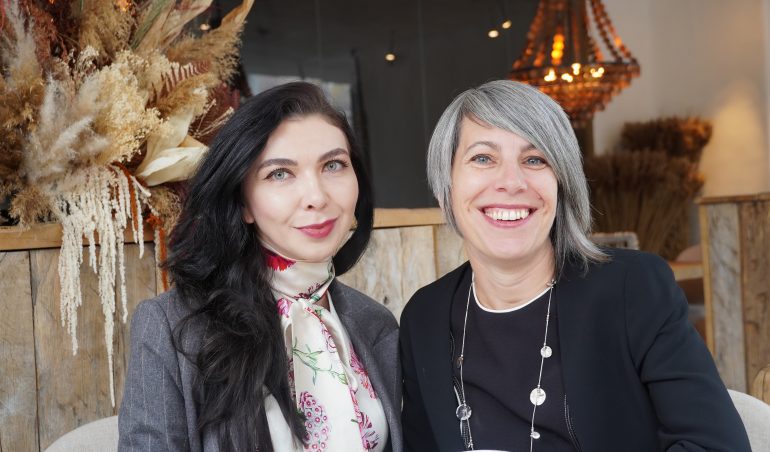
One year ago, the EU Advisory Mission and the Folke Bernadotte Academy teamed up to deliver a Skype-based one-on-one High Level Mentoring Programme on Gender Responsive Leadership to Ukraine’s Deputy Minister of Internal Affairs, Tetiana Kovalchuk. Last week in Kyiv, Tetiana met her mentor, Dr Leslie Groves Williams (FBA), in person for the first time. Over coffee, they reflected on the journey they have taken together and on what comes next
Q: Can you describe in brief what ‘Gender responsive leadership’ is and why it is important?
LGW: There is societal pressure now that our leaders will behave in a way that is human-rights compliant on the one hand, but also in a way that is effective and efficient. A gender-responsive leader is one who is able to do this by doing two things: first of all, they need to ensure that their organizational mandate is implemented in a gender-responsive way – this means that everything that the organization does, it does in a way that is fair to both women and men and reduces rather than perpetuates inequalities. And the second thing they need to do is ensure that their organisations internally are gender equal places to work. A gender responsive leader is someone who, beyond this, recognizes that women and men do not have equal opportunities to realise their full potential. They know that abuse of power and discrimination, based on one’s gender, is rife in today’s world. We have a long way to go. Statistics show that half the population of Ukraine think that inequality is a problem – that’s a big proportion of the population. Women are earning 27% less than men, despite working an hour more. Twelve percent of the parliament is women, yet they make up half the population. 1.1 million Ukrainian women are victims of violence in the family, but only 15% of them report this to the police. 600 women per year are dying from domestic violence, so this really is a life and death situation. Men, of course, suffer under this system too – whether they suffer in war, or in prisons. Men experience the highest rates of suicide, criminality, state-based violence. I work also as a magistrate, and my court is full of young men, prisons are full of young men, and this is not gender equality either. So this is why the work Tetiana and the Ministry is doing is so important. A good gender responsive leader knows that they need to take action to level the playing field, inside and outside the workplace. And they need to motivate and inspire their teams to follow suit. It’s not about having a gender advisor or gender focal point, it’s about stepping up and showing leadership.
Q: Why did you decide to take part in the high–level mentoring programme with EUAM/FBA?
TK: I remember when this idea first came about, it was during our meeting with EUAM’s gender advisor, Agata. At that time we were trying to establish a gender unit in the Ministry of Internal Affairs. I had no idea how to manage all of the challenges and obstacles in our way. I remember thinking that I must be a leader now, because I was sitting around the table with my colleagues, and I knew they were listening and definitely wanted something to destroy gender inequality and stereotypes – to have gender equality through all of our processes in establishing the rule of law in Ukraine. I realized that it was important for me to have support such as mentoring. I should express my gratitude to Leslie and EUAM because today I am strong, I have my power and understanding, and know what to do for the next steps. Maybe two or three years ago people did not understand these principles, but today we have a vision, knowledge and skills. I think it is of the utmost importance that we have this kind of centre of excellence now in our Ministry, and we can spread this knowledge to other ministries and agencies. I think we are all on the same page when it comes to gender equality.
Q: What are the characteristics of mentoring programme such as this, and what are the elements that make it an effective approach?
LGW: It’s not a one-off. It’s a structured medium-term support, with a very clear structure around three areas of leadership. It’s not really a gender equality training, it’s a leadership programme. I think that’s very important because modern leaders need to be gender responsive. It’s structured around three things, and the first one is ‘knowledge’. Do we understand what ‘gender equality’ actually means – these are words that have been misinterpreted so many times. So we make sure they have the concept clear in their heads, that they understand the legal framework, policy framework, organizational framework, etc. We try to make it simple for very busy leaders so that they have the knowledge they need to lead effectively. Secondly, leaders are responsible for managing resources, both human and financial, and for managing an organisation’s vision and results. Therefore, how can leaders use the management tools at their disposal to be gender responsive? So we talk about gender-responsive budgeting, gender-responsive human-resource management. How do you achieve parity? How do you ensure zero tolerance for sexual harassment? And thirdly, we know that leaders usually have a high IQ, but now we realise they also need ‘EQ’, or emotional intelligence as well as ‘WeQ’ which is about working with others. In 2019, the world is becoming more and more complex, and the ‘hero’ leader is no longer good enough. Leaders need to be able to work, connect, partner, inspire. So the third element of the programme is how you inspire others, how you get others to join you.
Q: What were your expectations of the mentoring programme before it started?
TK: To be honest, Leslie is an inspiration for me, and all of my expectations for the programme have come true, because today I have a great team and great support, and I have accumulated the knowledge that I was missing. The main gift from this programme is that now I know that we are able to dispel every stereotype. Without a gender policy it is absolutely impossible to build something new. We had a lack of competence and institutional capacity to implement our gender equality policy. But today we have such capacity. We can now create a new reality based on the gender equality policy.
Q: What were your expectations of Tetiana? Have you worked with senior government officials before? Has this mentoring programme differed from others?
LGW: This programme has been amended several times. It started with the Swedish government, and was then learned from and modified when it was used for the leadership of the OSCE. That was a seven-month programme, a bit different to this because it was for a whole team. I had seminars and brought in high-level speakers, they had personal development plans. Elements of the programme have also been brought to the United Nations departments of peace operations and political affairs. There is a demand for the programme because leaders see that it actually works. In terms of Tetiana, well I don’t take on work if I don’t think there is strong commitment, and in Tetiana’s case, Agata told me that “you have no worries”! Commitment, mutual trust and respect is the foundation of any working relationship. I think that Tetiana is totally committed to bring about the improvements she wants to see, but also the improvements that the international legal framework requires from her as a deputy minister in Ukraine.
Q: What parts of the mentoring programme have you found most useful and why?
TK: Every part of it! But the most important thing that Leslie has given me is the ability not to be afraid to show or reveal my vulnerability. Sometimes I doubt myself because society looks at me and says ‘ok she is a leader’ and they expect me to be a certain way. But I do have doubts, and I shared these with Leslie. I shared my doubts, my vision, my fears. She gave me knowledge, and emotional knowledge. I believe that today, we don’t live in the era of management, we live in the era of leadership. Today’s leaders must create future leaders. It is so important for me to show my team that they also must become leaders. I see it as my duty to eliminate stereotypes within our system, to make our institution service-oriented and human-centred.
Q: In an ideal scenario what do you want the outcome of the mentoring programme to be?
LGW: All of this is a process of refection, based on our own personal stories. Fighting for gender equality is tough, it is ‘David and Goliath’, you are fighting against structures, systems, norms, and it’s really lonely to be that gender-responsive leader. Many leaders I work with are worried what society will think of them, whether they might say the wrong thing and attract criticism and judgment, so the starting point is to build that inner strength and harness what is already there. The ideal outcome of the programme is those three things: does the leader have the knowledge they need? Do they have the management skills and can they change the systems and structures within their organisations? And how to be a strong and inspirational leader. Tetiana already has the leadership qualities naturally, so now the next step for us is to see how we can change the structures and systems towards transformation, for example how to get towards equality for the men and women in the ministry, how to ensure systems are in place to ensure zero tolerance towards sexism.
Q: Are there things you learnt during the mentoring programme you will be able to apply in your daily work?
TK: Well first of all, I have incorporated new rules for our team. Sometimes we organise events or conferences on gender equality for our employees, to pass on new knowledge and competences. But we have to understand that this is a process – there are so many levels and so many stages. Now we have our strategic vision, and there are so many people that have embraced this vision for gender equality because they know what gender equality policy gives them in their lives. We had a mission before, but now we have a strategic vision, in order to create a safe environment together, based on the gender equality policy. Every system is really just a community of people, and our leaders are ready to integrate the principles of gender equality because they know its benefits for society. I also think it is important to introduce new faces and new minds to this process, to protect what we have already done but also to provide new concepts and ideas in order to ensure the sustainable development of our system.
Q: Once an organization undertakes gender responsive measures for its leadership, what should it do to ensure this is maintained in the long term?
LGW: In order to transform an organisation, you need more than leaders. We need all staff across the board to engage in gender mainstreaming. So we need staff to step up, and to do that they need to be skilled up. We need to remove gender bias from our procedures, systems, policies. And remember, leaders move on, so we must do this on an ongoing basis. We’ve been trying to tackle this for hundreds of years, so it is not going to be a ‘quick fix’. But it is a ‘must fix’ for any nation that claims to be modern and fair. We need to step up and put our foot on the accelerator, like Tetiana and her team are doing, and like EUAM is doing.
Q: Having gone through six sessions of the mentoring programme, what is the best piece of advice you would give your male and female colleagues who are trying to become more gender responsive?
TK: To be a leader – because a leader is a person who is not afraid to take responsibility, but at the same time someone who is absolutely free in mindset and who destroys stereotypes. This will allow you and your community to develop as you want and according to what Ukrainian society requires.
